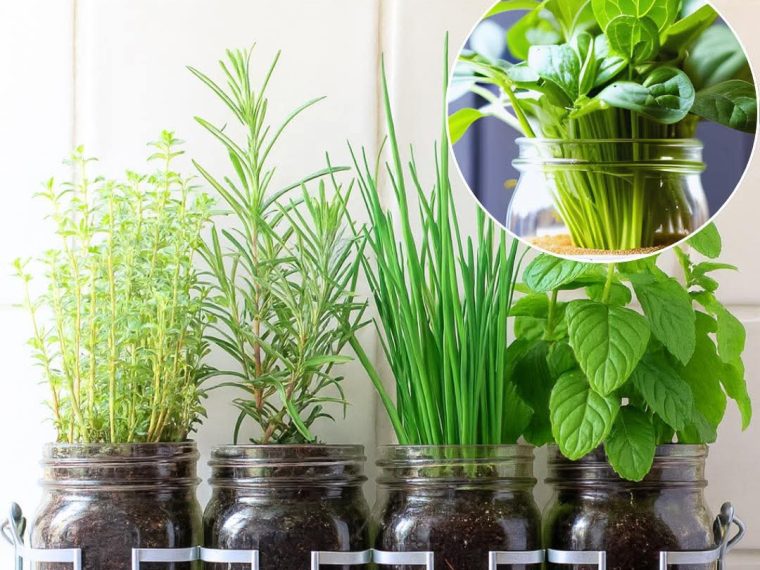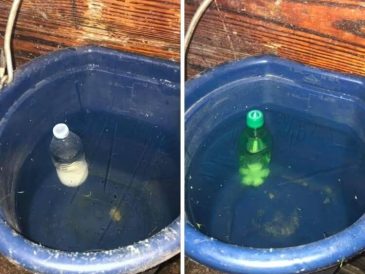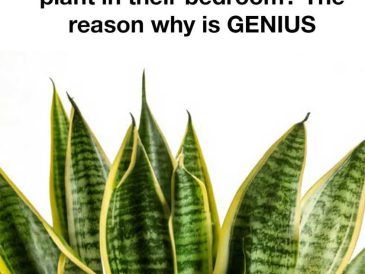Mason jars aren’t just for canning – they can also serve as tiny indoor gardens for herbs, greens, and even small vegetables.
Whether you’re short on space, want fresh food year-round, or simply love the look of greenery in glass jars, this method is practical and rewarding.
Why Grow Food in Mason Jars?
1. Space-Saving
Perfect for apartments, kitchens, or windowsills, mason jars make gardening accessible to anyone without a backyard.
2. Cost-Effective
A few jars, soil, and seeds can give you a steady supply of herbs and microgreens for just pennies compared to grocery store prices.
3. Aesthetic Appeal
Mason jars double as charming decor – imagine a row of basil, mint, or lettuce thriving on your windowsill.
4. Year-Round Freshness
No matter the season, you can harvest fresh herbs and greens from your jars, even in winter.
Things to Know Before You Start
- Drainage: Mason jars don’t have holes, so add a base layer of pebbles, small rocks, or activated charcoal to prevent root rot.
- Light: Place jars near a sunny window (south-facing works best). If natural light is scarce, use a grow light.
- Soil: Choose lightweight potting mix (not garden soil, which compacts too much in jars).
- Watering: Be careful – overwatering is the #1 mistake. Check moisture by touching the soil before adding more water.
10 Foods You Can Grow in Mason Jars (and How to Grow Them)
Basil in Mason Jars
- Soil Preference: Light, well-drained potting mix with perlite.
- Germination: Seeds sprout in 5–10 days at 70°F (21°C).
- Lifespan in Jars: 3–4 months before it gets woody; restart from cuttings or seeds.
- Common Problems: Yellowing leaves (too much water), leggy growth (not enough sun).
- Harvest Trick: Cut just above a leaf pair to encourage 2 new stems.
Mint in Mason Jars
- Soil Preference: Rich, moist soil.
- Propagation: Cuttings root easily in water within 7–10 days.
- Lifespan in Jars: Can grow indefinitely with regular cutting.
- Common Problems: Spider mites if too dry; fungal issues if too damp.
- Harvest Trick: Clip leaves often – mint thrives on frequent trimming.
Parsley in Mason Jars
- Soil Preference: Moist, fertile soil with compost.
- Germination: Very slow – 2 to 4 weeks. Pre-soak seeds overnight for faster sprouting.
- Lifespan in Jars: 4–6 months before plants get weak.
- Common Problems: Pale leaves = low nutrients. Add liquid fertilizer monthly.
- Harvest Trick: Always cut outer stalks first to let center grow back.
Cilantro in Mason Jars
- Soil Preference: Well-drained soil, prefers cooler temps.
- Germination: 7–10 days, faster if you lightly crush seeds before planting.
- Lifespan in Jars: Short – only about 6–8 weeks before bolting. Best to reseed often.
- Common Problems: Bolts quickly in heat – grow indoors in cooler areas.
- Harvest Trick: Cut leaves young for best flavor; older leaves get bitter.
Chives in Mason Jars
- Soil Preference: Sandy, well-drained mix.
- Germination: 10–15 days.
- Lifespan in Jars: Perennial – can live for years with good care.
- Common Problems: Mold if overcrowded; divide clumps yearly.
- Harvest Trick: Cut down to 1 inch above soil – plants regrow quickly.
Green Onions in Mason Jars
- Soil Preference: Moist, loamy soil.
- Regrowth: From bulbs, regrow multiple times after trimming greens.
- Lifespan in Jars: 4–6 harvests before bulbs weaken.
- Common Problems: Rot if waterlogged; gnats in overly damp soil.
- Harvest Trick: Leave 1–2 inches of white base for continuous regrowth.
Lettuce in Mason Jars
- Soil Preference: Light soil with compost, loves moisture.
- Germination: 7–10 days.
- Lifespan in Jars: 4–6 weeks before leaves get bitter.
- Common Problems: Leggy growth (too little light), bitter taste (too warm).
- Harvest Trick: Pick “cut-and-come-again” style – outer leaves only.
Spinach in Mason Jars
- Soil Preference: Rich, nitrogen-heavy soil.
- Germination: 5–9 days.
- Lifespan in Jars: 6–8 weeks before bolting.
- Common Problems: Needs cooler temps; wilts in heat.
- Harvest Trick: Cut outer leaves often, but leave the center crown.
Sprouts in Mason Jars
- Method: No soil – just seeds, water, and rinsing.
- Harvest: Ready in 4–6 days.
- Common Problems: Mold if airflow is poor; use mesh lids.
- Tip: Best seeds – alfalfa, mung beans, broccoli, lentils.
Strawberries in Mason Jars
- Soil Preference: Slightly acidic, well-drained mix.
- Light: Needs 8–12 hours daily – grow lights are best.
- Lifespan in Jars: 1–2 years, but best fruiting first year.
- Common Problems: Root rot if overwatered. Pollination indoors may need hand-pollinating.
- Harvest Trick: Snip runners to keep energy in fruiting.
Advanced Growing Tips for Mason Jar Gardening
Hydroponic Mason Jars
- Replace soil with water and liquid nutrients for herbs like basil and mint.
- Use net cups and clay pebbles for stability.
Self-Watering System – Place a cotton wick through the lid into a water reservoir below to keep soil moist automatically.
Companion Planting in Jars – Combine basil + chives or mint + parsley in larger jars for variety.
Pest Prevention
- Place jars indoors near a window screen to avoid fruit flies.
- Add a few drops of neem oil to the soil if gnats appear.
Rotation Schedule – Start new seeds every 2–3 weeks for continuous harvest of greens.
Health and Environmental Benefits
- Freshness at Hand: Harvest seconds before eating – maximizing flavor and nutrients.
- No Chemicals: Growing in jars means no pesticides, no plastic packaging.
- Sustainability: Reusing jars cuts waste and reduces carbon footprint.
- Wellness: Indoor gardening improves mood, reduces stress, and adds beauty to your home.
Growing food in mason jars is more than just a gardening hack – it’s a lifestyle shift toward sustainability, health, and self-sufficiency.
Whether you’re cultivating basil for pasta, sprouts for sandwiches, or strawberries for desserts, mason jars transform windowsills into mini farms.





